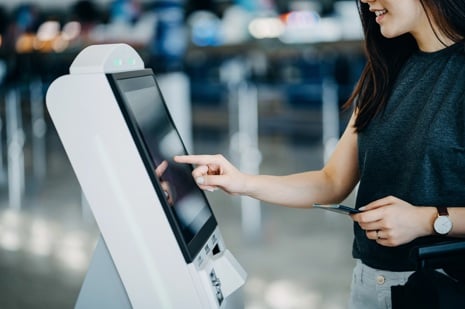Air travel has revolutionized the way we explore the world, connecting distant places and cultures like never before. However, the process of air travel itself has often been a source of frustration for passengers, with one of the main areas of congestion occurring during immigration regulations checks at the airport. These checks, performed by airline agents, involve verifying passengers' travel documents and ensuring they meet the necessary regulations for their intended destination. This manual process has long been a bottleneck in the air travel journey, causing delays, anxiety, and inefficiencies for both passengers and airlines alike.
The Three Crucial Checks for Passengers
There are three critical steps that passengers need to go through before they are allowed to board a flight, and each of them can take up time today:
- Positive ID Check: This involves verifying the identity of the passenger by comparing their photo and personal information with their travel document, such as a passport or ID card.
- Physical Security Check: This involves screening passengers and their belongings, and restricting access to ensure safety. The field is rapidly progressing through the integration of AI and machine learning.
- Immigration Regulations Check: This check ensures that passengers meet the passport and visa regulations of their destination country.
While these checks are essential for ensuring the safety and security of air travel, the manual nature of the process often leads to long lines, frustrated passengers, and inefficiencies for airlines.
Challenges of Immigration Regulations Checks
Immigration regulations checks come with their own set of challenges:
- Complex and Ever-Changing Regulations: Governments around the world have complex and frequently changing regulations, making it challenging for airlines and agents to stay up-to-date and ensure compliance.
- High Turnover of Checking Agents: The turnover rate among airline checking agents is high, leading to inexperienced personnel who struggle to understand and apply intricate regulations.
- Regulations that Resist Automation: Certain regulations, such as those requiring manual checks of physical documents, hinder the automation of compliance processes.
Impact on Passengers, Agents, and Airlines
These challenges have a significant impact on three key personas in the air travel ecosystem:
- Passengers: International travelers may encounter difficulties checking in online due to unclear reasons. These situations create anxiety and uncertainty, resulting in a poor travel experience. Such issues often arise from compliance-related problems, leaving passengers without clear instructions or opportunities to resolve the issues remotely.
- Checking Agents: Inexperienced agents facing a high volume of passengers often resort to shortcuts to meet efficiency targets, inadvertently leading to inadmissible passengers and fines for airlines.
- Facilitation Managers: These professionals struggle to manage compliance processes efficiently, often fielding questions from agents around the world who struggle to understand complex regulations.
Timatic AutoCheck: A Solution for Seamless Travel
Recognizing the challenges and drawbacks of the current manual compliance process, 15 years ago IATA introduced Timatic AutoCheck, a groundbreaking solution aimed at automating travel document compliance. The goal is to achieve a seamless travel experience for passengers while ensuring airlines operate efficiently and profitably.
Timatic AutoCheck aims to address these challenges and revolutionize the travel document compliance process. By automating compliance checks, the solution offers several key benefits:
- Empowering Passengers: Timatic AutoCheck guides passengers through compliance requirements step by step, enabling them to prepare and clear immigration regulations in advance. This enables self-service check-in, reducing the need for manual intervention.
- Assisting Checking Agents: The solution provides clear and dynamic instructions to agents, simplifying the compliance process and reducing the likelihood of errors or shortcuts.
- Enhancing Facilitation Managers' Efficiency: Dynamic responses eliminate the need for managers to explain complex regulations repeatedly, freeing them to focus on improving operational efficiency.
- Minimizing Fines and Delays: By reducing errors and automating compliance, Timatic AutoCheck helps airlines avoid immigration fines and passenger repatriation costs.
- Enabling Growth and Inspiration: The solution's simplified regulations and comprehensive information enable passengers to explore destinations and plan their trips more easily, inspiring travel and growth in the industry.
A Glimpse Into the Future
The latest iteration of Timatic AutoCheck, released in 2023, represents a significant leap forward in automating immigration regulations checks. This version addresses the unique challenges faced by different stakeholders:
- Passenger Empowerment: Timatic AutoCheck places the power in the hands of passengers by offering explicit and tailored instructions for compliance. Rather than cryptic regulations, passengers receive actionable guidance that enables them to navigate the compliance process confidently.
- Agent Efficiency: For check-in agents, the newest solution simplifies the compliance process even further. It provides precise information on what needs to be done, eliminating the need for agents to decipher complex regulations. The result is faster processing, shorter queues, and improved passenger satisfaction.
- Operational Excellence: Facilitation managers, responsible for travel document compliance, now benefit from dynamic and explicit responses. With reduced inquiries from agents seeking clarification, facilitation managers can focus on enhancing operational efficiency and fine-tuning compliance processes.
A Bright Future for Air Travel
The introduction of IATA Timatic AutoCheck has marked a significant milestone in the journey towards seamless and contactless travel. By harnessing the power of automation, Timatic AutoCheck has successfully addressed the challenges posed by complex regulations, inexperienced agents, and manual interventions. This transformative technology empowers passengers, streamlines agent operations, and enhances the overall travel experience. As the latest iteration of Timatic AutoCheck is made available, it is poised to revolutionize the industry further, laying the foundation for a future where passengers can embark on their journeys with confidence and ease, while airlines operate more efficiently and sustainably than ever before.
